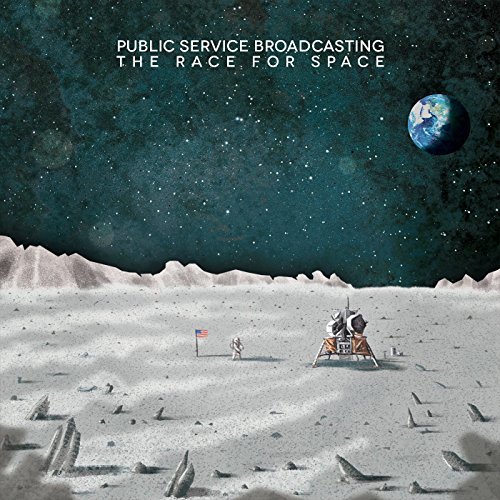
Public Service Broadcasting
The Race for Space
Release Date: Feb 24, 2015
Genre(s): Pop/Rock, Alternative/Indie Rock
Record label: Test Card
Music Critic Score
How the Music Critic Score works
Buy The Race for Space from Amazon
Album Review: The Race for Space by Public Service Broadcasting
Very Good, Based on 7 Critics
Based on rating 4/5
Pseudonymous London duo Public Service Broadcasting hit upon a winning combination of guitars, electronics and vintage public information films for their 2013 debut, Inform-Educate-Entertain. The follow-up focuses on the US-Soviet space race, between 1957 and 1972. It’s a smart move. Archive samples evoke the wonder and majesty of mankind’s most giant leap, and they’re complemented by finely judged soundscapes, from the mournful, static-soaked drone of Fire in the Cockpit (detailing the tragedy of Apollo 1) to the pulsing euphoria of Go! (the successful July 1969 moon landing).
Based on rating 8/10
Every so often someone has an idea so brilliant you hate them a little bit, because you didn’t think of it yourself. Public Service Broadcasting are one of those ideas. The London duo make sprightly electronica and choppy funk rock based around samples from old public information films, cine-footage and radio broadcasts. It could be dismissed as novelty if it wasn’t done so well, as evidenced by the magnificent ‘London Can Take It’, the atmospheric Blitz-themed track which first got them noticed back in 2012.
Based on rating 7.5/10
Head here to submit your own review of this album. On paper, Public Service Broadcasting sound nothing more than a gimmick. A band that utilises samples from propaganda films and archival footage to create experimental tracks sounds like something a university lecturer who'd been listening to too much J Dilla or The Avalanches would do to jazz up a lecture.
Based on rating 3.5/5
“And the question for us now is whether that was the beginning of something or the end of something. I choose to believe it was only the beginning.”– Barack Obama, April 15 2010, John F. Kennedy Space Center It might have been only the beginning for Obama, but if you put the same question to Public Service Broadcasting, you’d receive a more ambivalent answer.
Based on rating 3/5
The year is 1957. Paul Anka is Number One, Harold Macmillan has recently set up shop at 10 Downing Street and the mercury is dropping ever lower on the Cold War thermometer. Most importantly, however, a metal ball named Sputnik is hurtled into orbit, launching with it a new human obsession: Space. While never losing its dark mystique, public fascination slowly turned to the greater computing power in their toothbrush than in the tin cans of yesteryear.
Based on rating 3/5
It’s fitting that in a week where the Mars One project announced its shortlist of those who have volunteered themselves on a one-way mission to the red planet, that Public Service Broadcasting should release a concept album about the space race. Opening with John F Kennedy’s “We choose to go to the moon” speech, the album continues in the London duo’s theme of putting stories of human endeavour (previous work has tackled climbing Everest and the invention of colour TV) to the tune of madcap meanderings. Veering from krautrock to ambient postrock, Gagarin is a celebratory, if rudimentary, funk jam; Valentina (a tribute to the first woman in space) is given a welcome lustre with additional vocals from folk duo Smoke Fairies.
Opinion: Very Good
Public Service Broadcasting The Race for Space (Test Card Recordings) No wonder Public Service Broadcasting finds favor with the NPR set. News geeks who play along with the Wait Wait... Don't Tell Me! podcast are duty-bound to be intrigued by a London duo that reappropriates actualities from the British Film Institute archive for musical ends. More Paul Hardcastle than Negativland, PSB doesn't subvert text as much as build an alternative paradigm for engaging with the historical record.
'The Race for Space'
is available now

